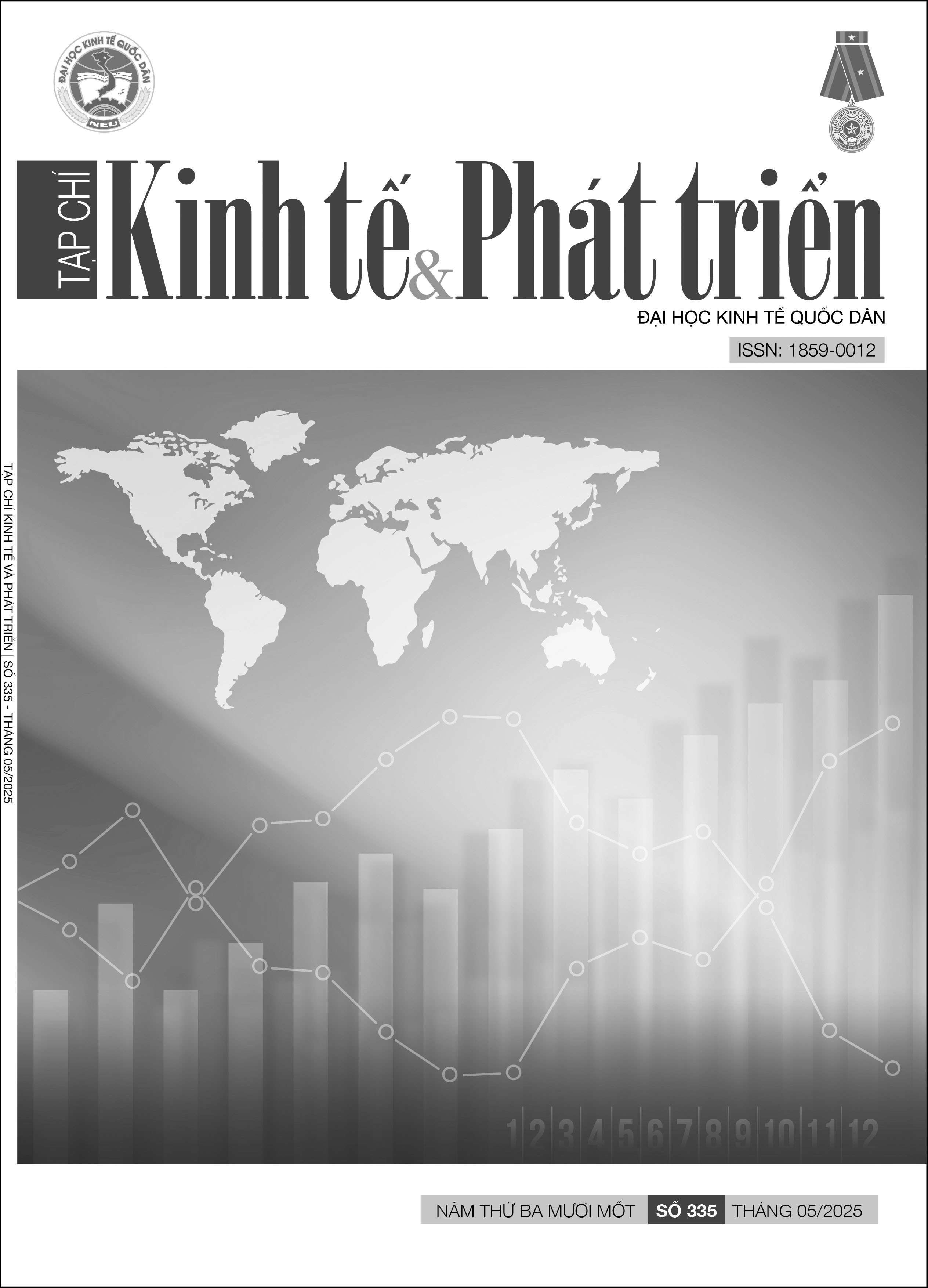Quản trị doanh nghiệp và khả năng sinh lời của các ngân hàng trên toàn cầu
Từ khóa:
Khả năng sinh lời, ngân hàng, quản trị doanh nghiệp, OLS gộp, mô hình hiệu ứng cố địnhTóm tắt
Bài viết phân tích tác động của quản trị công ty đến khả năng sinh lời trong ngành ngân hàng. Dữ liệu thứ cấp được thu thập từ các cơ sở dữ liệu được sử dụng rộng rãi trong lĩnh vực tài chính–ngân hàng gồm Refinitiv và World Bank. Mẫu nghiên cứu gồm 4.574 quan sát từ các ngân hàng niêm yết trên toàn cầu từ năm 2009 đến năm 2023. Phân tích thực nghiệm chỉ ra rằng các ngân hàng có điểm số quản trị cao hơn cũng là những ngân hàng có khả năng sinh lời tốt hơn. Mối quan hệ tuyến tính dương giữa quản trị và khả năng sinh lời của các ngân hàng tiếp tục được củng cố với mô hình hiệu ứng cố định. Kết quả nghiên cứu khẳng định vai trò quan trọng của cơ chế quản trị trong việc nâng cao kết quả tài chính của các ngân hàng.
Tài liệu tham khảo
Alodat, A.Y., Salleh, Z., Hashim, H.A., & Sulong, F. (2022). Corporate governance and firm performance: Empirical evidence from Jordan. Journal of Financial Reporting and Accounting, 20(5), 866-896.
Ayadi, M.A., Ayadi, N., & Trabelsi, S. (2019). Corporate governance, European bank performance and the financial crisis. Managerial Auditing Journal, 34(3), 338-371.
Boachie, C. (2023). Corporate governance and financial performance of banks in Ghana: the moderating role of ownership structure. International Journal of Emerging Markets, 18(3), 607-632.
Boubakri, N., Mirzaei, A., & Samet, A. (2017). National culture and bank performance: Evidence from the recent financial crisis. Journal of Financial Stability, 29, 36-56.
Dietrich, A., & Wanzenried, G. (2011). Determinants of bank profitability before and during the crisis: Evidence from Switzerland. Journal of International Financial Markets, Institutions and Money, 21(3), 307-327.
Fernandes, C., Farinha, J., Martins, F.V., & Mateus, C. (2018). Bank governance and performance: A survey of the literature. Journal of Banking Regulation, 19, 236-256.
Freeman, R.E. (1984). Strategic management: A stakeholder approach. Pitman, Boston.
Del Gaudio, B.L., Porzio, C., Sampagnaro, G., & Verdoliva, V. (2021). How do mobile, internet and ICT diffusion affect the banking industry? An empirical analysis. European Management Journal, 39(3), 327-332.
Gutiérrez‐Ponce, H., & Wibowo, S.A. (2024). Do sustainability practices contribute to the financial performance of banks? An analysis of banks in Southeast Asia. Corporate Social Responsibility and Environmental Management, 31(2), 1418-1432.
Jensen, M.C., & Meckling, W.H. (1976). Theory of the firm: Managerial behavior, agency costs and ownership structure. Journal of Financial Economics, 3(4), 305-360.
John, K., De Masi, S., & Paci, A. (2016). Corporate governance in banks. Corporate Governance: an International Review, 24(3), 303-321.
John, K., & Qian, Y. (2003). Incentive features in CEO compensation in the banking industry. FRBNY Economic Policy Review, 9, 109–121.
Kanas, A., Vasiliou, D., & Eriotis, N. (2012). Revisiting bank profitability: A semi-parametric approach. Journal of International Financial Markets, Institutions and Money, 22(4), 990-1005.
Kirkpatrick, G. (2009). The corporate governance lessons from the financial crisis. Financial Market Trends, 2009(1), 61–87. Organisation for Economic Co-operation and Development (OECD). https://doi.org/10.1787/fmt-v2009-art3-en.
Laeven, L. (2013). Corporate governance: what’s special about banks?. Annual Review of Financial Economics, 5, 63-92.
Laeven, L., & Valencia, F. (2020). Systemic banking crises database: A timely update in COVID-19 times (Working Paper). International Monetary Fund.
Lafuente, E., Vaillant, Y., & Vendrell-Herrero, F. (2019). Conformance and performance roles of bank boards: The connection between non-performing loans and non-performing directorships. European Management Journal, 37(5), 664-673.
LSEG (2024). Environmental, social and governance scores from Refinitiv. https://www.lseg.com/content/dam/data-analytics/en_us/documents/methodology/lseg-esg-scores-methodology.pdf.
Macey, J.R., & O’hara, M. (2003). The corporate governance of banks. FRBNY Economic Policy Review, 9, 91-107.
Makpotche, M., Bouslah, K., & M’Zali, B. (2024). Corporate governance and green innovation: international evidence. Review of Accounting and Finance, 23(2), 280-309.
Menicucci, E., & Paolucci, G. (2016). The determinants of bank profitability: empirical evidence from European banking sector. Journal of Financial Reporting and Accounting, 14(1), 86-115.
Neitzert, F., & Petras, M. (2022). Corporate social responsibility and bank risk. Journal of Business Economics, 92(3), 397-428.
Peni, E., & Vähämaa, S. (2012). Did good corporate governance improve bank performance during the financial crisis?. Journal of Financial Services Research, 41, 19-35.
Petersen, M.A. (2009), Estimating standard errors in finance panel data sets: Comparing approaches. Review of Financial Studies, 22(1), 435–480.
Saif-Alyousfi, A.Y. (2022). Determinants of bank profitability: evidence from 47 Asian countries. Journal of Economic Studies, 49(1), 44-60.
Wang, L.L. (2023). Transmission effects of ESG disclosure regulations through bank lending networks. Journal of Accounting Research, 61(3), 935-978.





